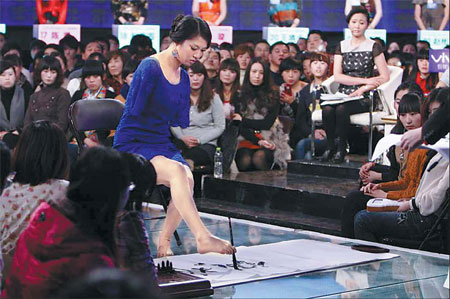In TV's golden age, that's entertainment
Updated: 2012-10-12 11:02
By Han Bingbin (China Daily)
|
|||||||||||
|
Renowned musician Liu Huan appears in The Voice of China as one of the show's judges and coaches. Ju Huanzong / Xinhua |
|
Lei Qingyao, who lost both of her arms in an accident when she was 3, draws with her foot on Jiangsu TV's dating show If You're the One. Chun Wan / for China Daily |

Producers have come a long way in making primetime reality shows for Chinese viewers
The past three years have been the golden age for Chinese TV reality shows. They've grown in number and variety, and they dominate weekend primetime hours on almost every major broadcaster. But it's not hard for viewers to notice the shows' resemblance to foreign small-screen hits. Growing along with the production scale of the singing contests, dating shows and game shows is a bad reputation among Chinese TV producers for unauthorized imitation of foreign program formats.
But industry insiders say the copycatting is no longer common and many of the shows nowadays that are suspected of stealing ideas are in fact authorized reproductions.
"There's a new consensus for gaining authorization. That's the latest trend," says Zheng Xuan, director of the program research center at Hubei TV.
Hubei TV recently became the authorized broadcaster of the Chinese version of I Love My Country, originally a Dutch TV show, after the lackluster performance of its first season on Sichuan TV in 2009.
It's hard to trace which Chinese broadcaster was the first to buy the rights to a foreign show. But Hunan TV, one of the most-watched and leading entertainment broadcasters, took the initiative by producing authorized Chinese versions of the UK-originated Strictly Come Dancing and Just the Two of Us in 2007.
The trend became noticeable when Hunan TV's authorized reproduction of Take Me Out in 2009 set off a wave of similar dating shows in China, including Jiangsu TV's If You're the One in 2010.
"But later, Jiangsu TV was openly criticized by Hunan TV for copyright infringement. I think it was this legal dispute that made Chinese broadcasters nationwide more aware of respecting copyright," Zheng says.
Since 2009, Chinese television has seen more than 30 authorized reproductions of foreign reality shows - this year alone, there were at least 10. Nearly all of these programs originally came from Europe. The BBC, London-based FremantleMedia, and the Dutch production companies Talpa and Endemol have so far been the main suppliers of these program formats. Half of the shows are aired on Hunan TV, Shanghai's Dragon TV, Zhejiang TV and Jiangsu TV, arguably China's four most-watched satellite channels.
While provincial channels have played a leading role in the craze, at the end of last year, China Central Television also joined the trend with its applauded reproduction of Australia's improvised comedy program Thank God You're Here.
The main reason for the nationwide craze for foreign program formats, Zheng says, is that domestic broadcasters are still short of creative ideas.
In a research trip to the UK in 2010, Zheng was surprised to find that some broadcasters invited not only dramatists and other professionals, but also people from the general public for joint brainstorming sessions. In China, Zheng said, it's often the leaders who point the direction.
Moreover, primetime entertainment shows, which draw the most advertisers, place heavy emphasis on high audience ratings and are often subject to format revisions. Zheng complained that these revisions are so frequent that domestic broadcasters barely leave time and room to create, experiment with and evaluate their own program ideas.
"Instead of letting their own people take a risk, decision-makers like to borrow successful ideas from abroad. It's quick and safe," Zheng said.
Chinese producers used to duplicate a foreign show by copying its every detail in a new program. But it didn't work well because the producers got only superficial experience that way.
By buying the right to use the format, Zheng said, they have a chance to gain a full measure of production experience in addition to learning from the concept editing done by the original channels. The producers are usually given a formula, which they call the "bible". This offers guidelines on production processes, some as detailed as where to place a camera and how to switch a scene.
But even with this imported technological support, many reproductions in China are far from successful. Most have had mediocre success, earning less than a rating of 1 - far from satisfactory, considering the reported millions of yuan Chinese broadcasters have thrown into the purchase.
Canxing Production Publicity Director Lu Wei thinks the reason is obvious: The atmosphere and tempo of many programs are far from ideal, and it's definitely a problem with their technical production.
"The program format itself is not omnipotent. If the local production team is not well trained, the final result won't be good. What the bible offers is simply a framework of ideas. You can only effectively apply it after you think out why they are doing it so," Lu said.
"After all, it's a matter of how hard and quickly you can learn. You have to know what exactly other people are good at before you create something new to overpower them."
With such devotion to learning, Lu said Canxing has trained a high-level editing team while producing the Chinese version of Got Talent, which has become the first huge success in the reproduction genre. The show reached 600 million viewers and had a whopping 5.91 rating in its Sunday primetime slot on Dragon TV in July last year - in China, shows with as little as a 1.3 rating are usually seen as hits.
The team had two of their innovations included in the latest issue of the format's bible, according to Lu. One is adding a live voting session by media representatives across the country. The other is giving more importance to personalizing the contestants. Both have contributed to the success of a talent competition in a Chinese cultural context.
The company brought its experience to the production of The Voice of China, which has been aired on Zhejiang TV since mid-July. So far, the show has dominated Friday nights, with a 4.6 rating at its peak. Though many reproductions have had dismal performances, the success of Got Talent and The Voice of China seemed bright enough to build local producers' confidence.
"Since Got Talent, Chinese producers have seen the real value of format purchase. After The Voice, more TV stations and production companies started to buy foreign program formats," said Xu Yang, general manager of Shanghai- and London-based program format broker IPCN.
"Everyone is looking for the next Voice and Got Talent."
IPCN, set up by former ITV executive Mick Desmond, has so far licensed more than 10 foreign formats in China, including Got Talent, The Voice and Sony Pictures Television's The Sing-Off. Its business has expanded to online platforms since the launch of a local version of Banijay Entertainment's Date My Car on IQIYI.com.
Rebecca Yang, CEO of IPCN, has said that nowadays you have a better chance of getting away with edgy formats in less mature markets like China than in the developed ones like the UK. But, like what used to happen in other fast-growing format markets such as Russia and Malaysia, the craze for foreign formats is only "a phase of blind worship," Xu added.
Hu Zhengrong, vice-president of Communication University of China, remains optimistic about what he thinks is "an inevitable learning phase before China has a mature TV industry".
"As in every other industry, buying technology is a way to quickly lessen the gap. If they started buying formats 10 years ago, when TV was still a more powerful platform than the Internet, the industry could have been a lot more mature now," Hu said.
"But no hurry. There are so many program formats in the West, they still have a lot more to learn."
hanbingbin@chinadaily.com.cn
(China Daily 10/12/2012 page24)
Today's Top News
Rescuers race against time for quake victims
Telecom workers restore links
Coal mine blast kills 18 in Jilin
Intl scholarship puts China on the map
More bird flu patients discharged
Gold loses sheen, but still a safe bet
US 'turns blind eye to human rights'
Telecom workers restore links
Hot Topics
Lunar probe , China growth forecasts, Emission rules get tougher, China seen through 'colored lens', International board,
Editor's Picks

|

|

|

|

|

|







